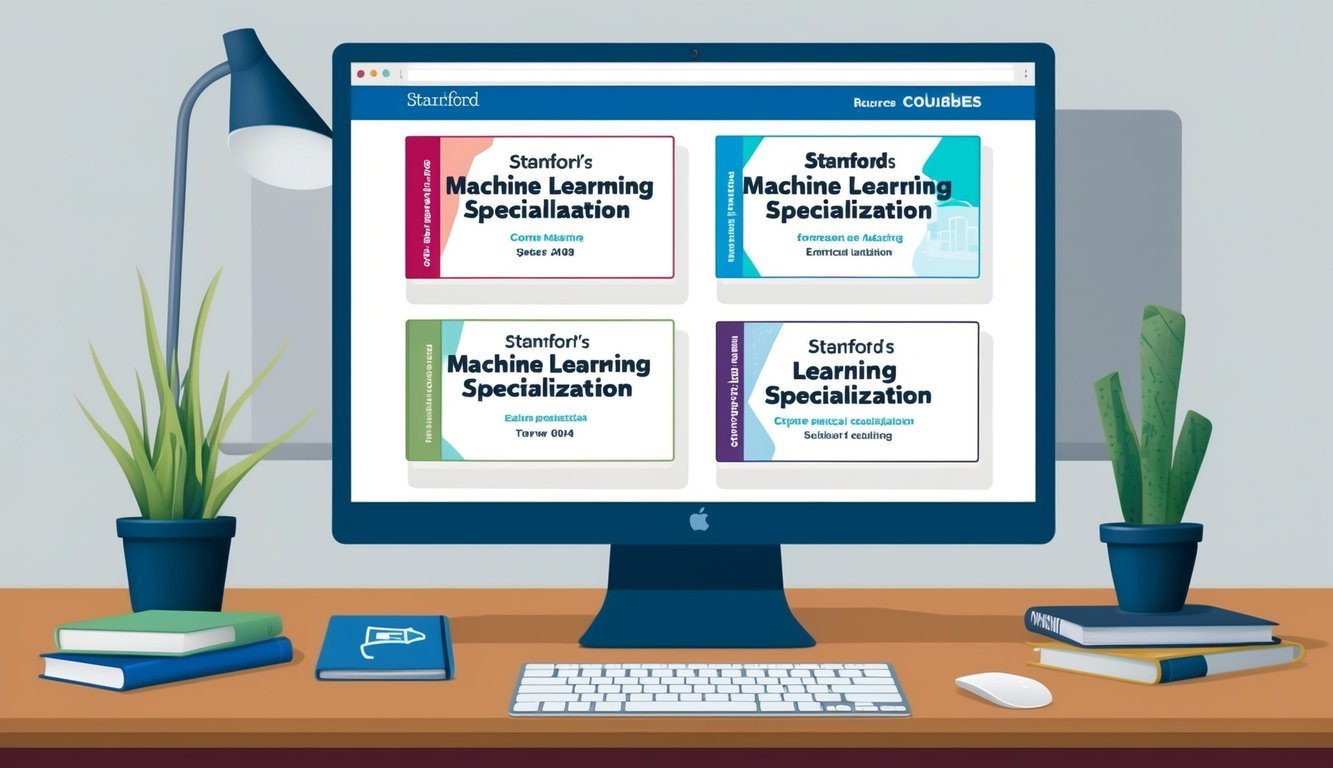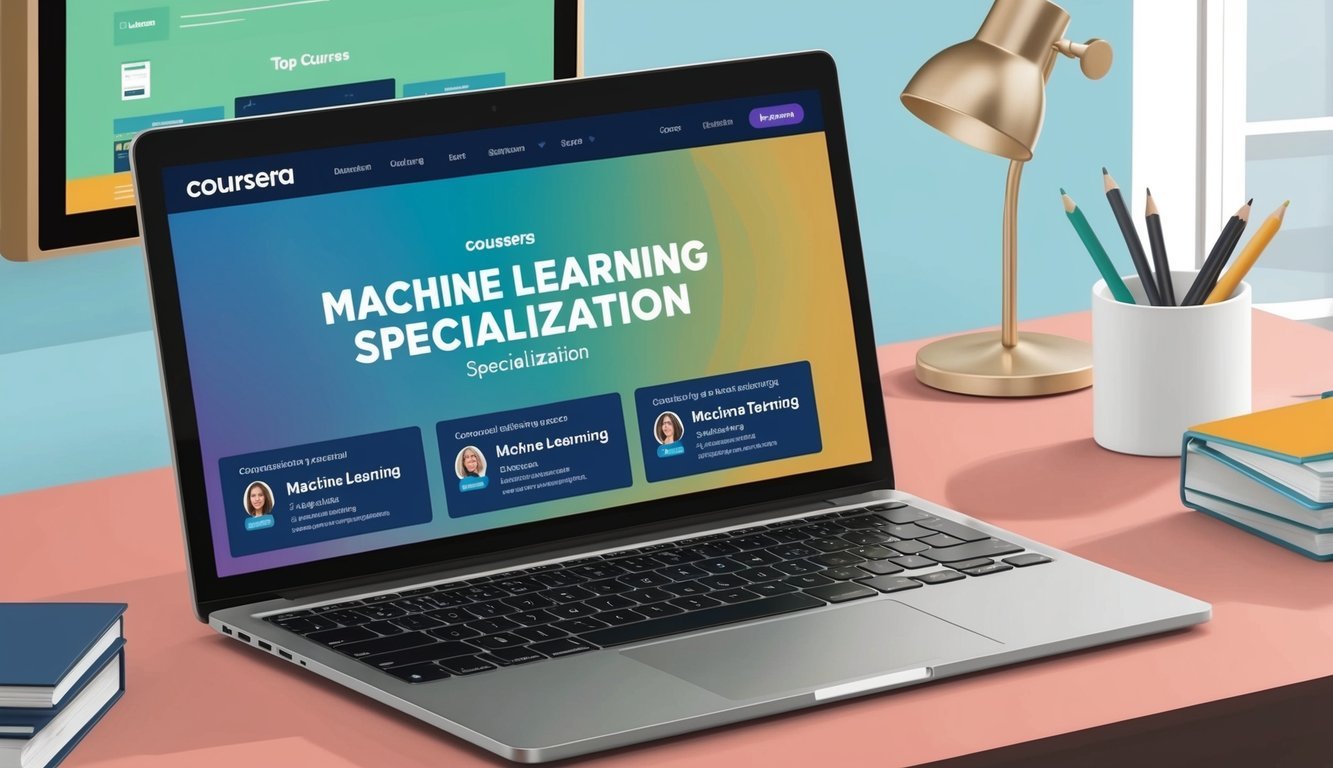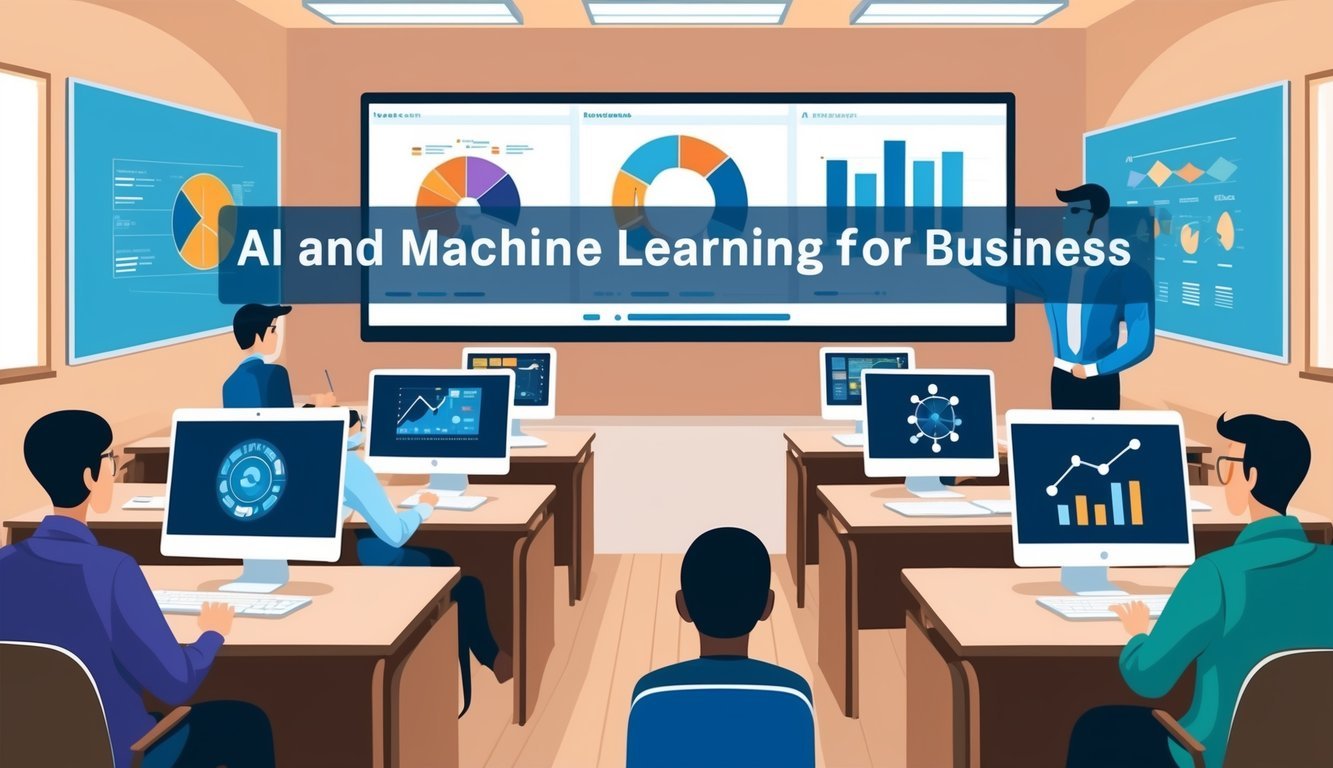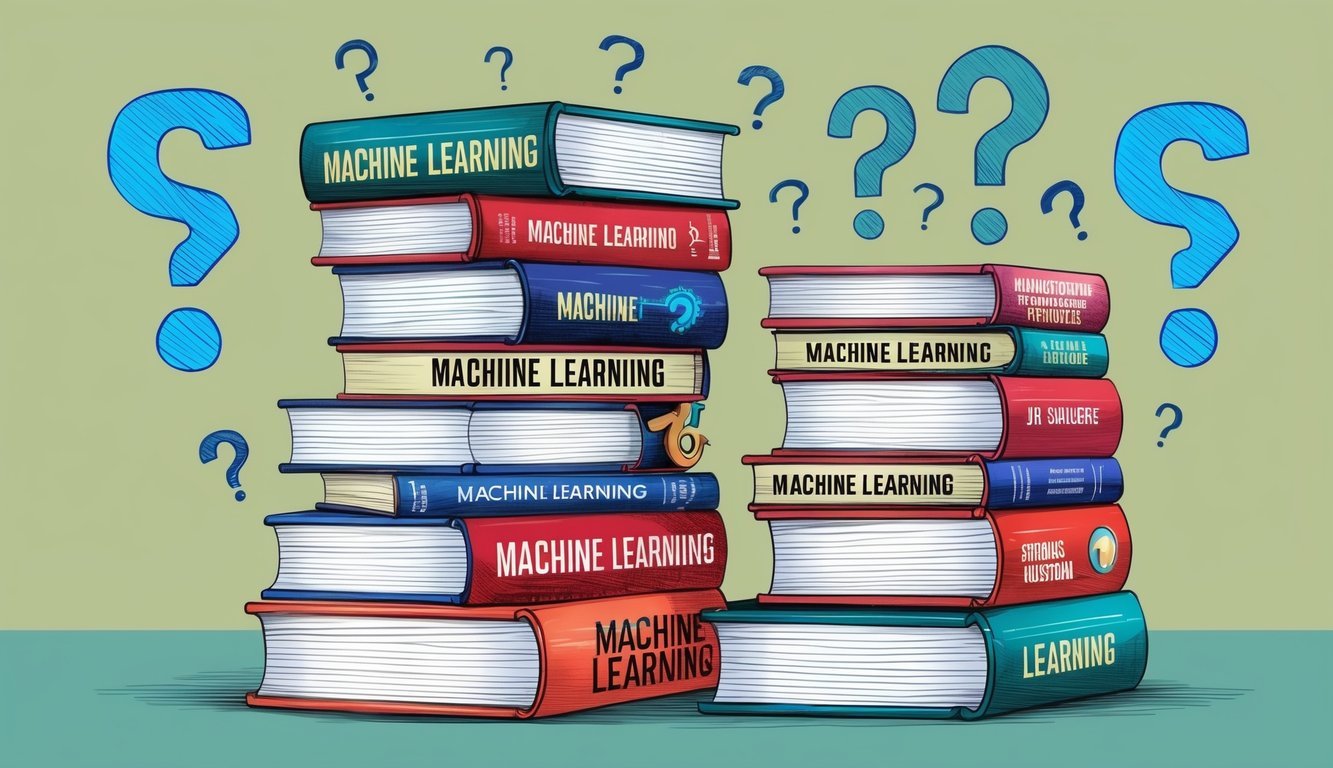Machine learning is changing the way we live! From self-driving cars zooming down the road to your smart home devices turning on the lights, this tech is pretty much everywhere.
Interested in getting in on the action? Taking a course is a great way to dip your toes in.
You’ll discover how computers can pick up patterns and make decisions without someone needing to hold their hand through every step.

There’s a smorgasbord of online machine learning courses from top-notch schools and teachers. These courses teach you the basics and even help you tackle some real AI projects.
Some target beginners, while others are perfect for those who already have some coding chops.
Let’s dive into four of the best machine learning specializations that can amp up your skills.
1) Coursera’s “Deep Learning Specialization” by Andrew Ng
Thinking about jumping into deep learning? Check out the Deep Learning Specialization on Coursera, led by Andrew Ng, a rock star in the AI world.
This course lays out the fundamentals of neural networks, covering various types like convolutional and recurrent networks.
Plus, you’ll touch on fascinating topics like computer vision and natural language processing.
One of the coolest parts? This specialization blends theory with hands-on practice.
You’ll actually build your own models—talk about learning by doing! And the course is split into five sections, each one building on the last.
You’ll level up your skills bit by bit, and by the end, you’ll have a solid understanding of deep learning.
Folks really seem to dig this course.
It’s often praised for being clear and easy to follow, even for newcomers.
Just know—you’ll need to put in some effort!
2) Stanford’s “Machine Learning Specialization”

Want to learn machine learning from some of the best? Stanford’s Machine Learning Specialization is worth checking out.
It’s a collaboration between Stanford Online and DeepLearning.AI, which definitely gives it some street cred.
This program suits newbies perfectly.
You’ll start with the basics and work your way up to real AI applications.
Pretty awesome, right?
The specialization features three courses designed to walk you through the fundamentals step by step, like a friendly roadmap leading you to AI mastery.
Plus, it’s an upgraded version of a wildly popular course.
They’ve packed in even more knowledge, so you’ll benefit from the latest insights in machine learning.
By the end, you’ll not only have hands-on experience with machine learning techniques, but you’ll also be ready to tackle real-world AI challenges.
It’s a fantastic kickstart for your journey into artificial intelligence!
3) University of Washington’s “Machine Learning Specialization” on Coursera

Want to dive into machine learning but feel lost? The University of Washington’s Machine Learning Specialization on Coursera could be just what you need.
This program kicks off with a course that treats machine learning like a black box, focusing on matching tasks to the right tools and evaluating the results.
It’s pretty neat!
Next, you’ll explore the nitty-gritty of machine learning.
You’ll learn about different models and algorithms that make things tick.
Don’t stress if you’re new—this specialization is designed to be beginner-friendly.
You’ll get the hang of the basics and learn how to apply them to real-world AI scenarios.
One of the cool features is how it simplifies complex ideas.
You’ll get straightforward explanations of popular algorithms and see them in action.
By the end, not only will you grasp machine learning fundamentals, but you’ll also know how to tackle real problems with your newfound skills.
4) edX’s “AI and Machine Learning for Business” by Columbia University

Want to figure out how AI can power your business? Check out the AI and Machine Learning for Business course on edX.
It’s tailor-made for those of us working in the business world.
This course is perfect if you’re aiming to use AI in real-life work situations.
You’ll learn the basics of artificial intelligence and machine learning without drowning in tech jargon.
What’s special about this course? It’s crafted by Columbia University, which has a knack for blending business savvy with AI expertise.
You’ll spot opportunities to leverage AI in your company and learn how to discuss AI projects with your team.
When you finish, you’ll be ready to make informed decisions about using AI in your business.
Perfect for staying ahead in today’s tech-driven landscape, don’t you think?
And don’t worry—no need to be a math genius or a coding whiz to take this course.
It’s designed for everyday business folks!
Understanding Machine Learning Specializations
Machine learning specializations offer focused training in this exciting field, teaching you vital skills and giving you a competitive edge in the job market.
Why Specialize in Machine Learning?
Machine learning is a hot topic these days, making waves across various industries as it tackles complex problems.
By specializing, you’ll dive deeper into this area.
You’ll learn how to create intelligent systems that predict trends and make decisions.
With job demand skyrocketing, companies are on the lookout for experts in AI and big data.
Plus, specializing helps you stay up to date with tech advancements.
The field moves fast, and having a specialization means you’ll be in the know about new algorithms and tools.
How Specializations Benefit Your Career
A machine learning specialization can supercharge your career in several ways.
It signals to employers that you’re serious about the field and equips you with practical skills they’re craving.
Many of these programs include hands-on projects for your portfolio, giving you real-world experience to flaunt in interviews.
And let’s not forget about those shiny certificates from platforms like Coursera.
They’re impressive additions to your resume!
You’ll also connect with fellow learners and experts, opening doors to job opportunities and collaborations.
Some programs, like the IBM Introduction to Machine Learning Specialization, even gear you up for industry certifications.
Comparing Types of Machine Learning Specializations
Machine learning specializations come in various shapes and sizes.
Some are all about deep learning, while others cover a broader range of ML concepts.
You’ll even find programs aimed at specific industries.
Deep Learning vs. General Machine Learning
Deep learning focuses on neural networks and AI.
The Deep Learning Specialization on Coursera is a popular pick, hitting topics like neural nets, computer vision, and natural language processing.
On the flip side, general ML courses give you a wider view.
They cover algorithms like decision trees and clustering.
A good example is the Machine Learning Specialization by Andrew Ng, which helps you build a sturdy foundation in ML basics.
Which path should you take? Go for deep learning if you’re into AI and big data, and choose general ML if you want a broader skill set.
Industry-Specific Specializations
Some courses zero in on certain fields.
Healthcare, finance, and marketing all use ML differently.
If you’re in healthcare, take a look at the AI in Medicine Specialization, which shows you how to apply ML to medical data.
For those in finance, why not check out the Machine Learning and Reinforcement Learning in Finance Specialization? You’ll learn how to use ML for stock trading and risk management.
These specialized courses help you tackle real-world problems in your field.
They’re perfect if you already have a direction in mind for your skills.
Frequently Asked Questions

Machine learning courses are diverse, and you probably have some questions about which one is best for you.
Let’s tackle a few common ones:
Which machine learning course is best for beginners?
If you’re just starting out, definitely check out Stanford’s “Machine Learning Specialization”.
It covers the essentials without requiring a heavy math background.
You’ll grasp core concepts and get hands-on practice with real examples.
What about advanced machine learning specializations?
If you’re ready to step up your game, look at the Deep Learning Specialization by Andrew Ng.
It digs into neural networks and advanced AI topics.
Expect some complex projects that’ll expand your skills.
Are there any comprehensive machine learning courses available for free?
While you may need to pay for a certificate, the course content is often free to audit.
Can you recommend machine learning courses that offer a certificate?
The AI and Machine Learning for Business course by Columbia University provides a professional certificate.
It’s great for those looking to apply ML within a business context, and hey, a recognized credential looks fabulous on your resume!
What key topics should I seek when picking a machine learning course?
Look for courses that cover supervised and unsupervised learning, deep learning, and practical applications.
Good courses should also introduce you to popular tools like TensorFlow or PyTorch.
Where can I find the top-rated machine learning courses online?
Top-notch courses from leading universities are available on platforms like Coursera and edX.
One highly acclaimed course is the Machine Learning Specialization by the University of Washington.
It blends solid theory with hands-on projects, making it a fantastic choice.

